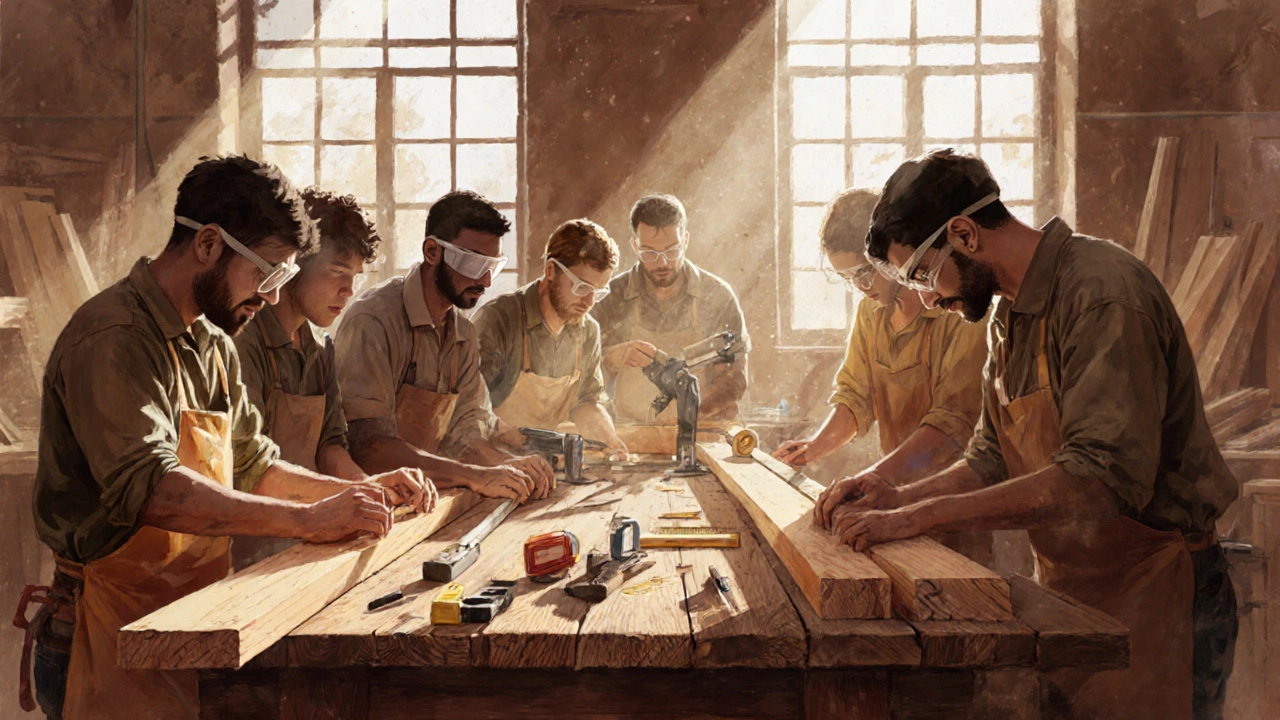Quick Trade Selector
Find Your Fastest Trade Match
Select your priorities to discover which trades match your needs best.
Select your preferences above and click "Find Matching Trades" to see which vocational paths fit your needs.
If you’re hunting for the quickest trade to master, you’ve come to the right place. In the next few minutes you’ll see which vocations you can pick up in weeks, what the earning potential looks like, and how to start learning without quitting your day job.
What makes a trade "quick"?
When we talk about a Vocational trade that’s quick to learn, three factors usually line up:
- Skill‑stack simplicity: The core tasks can be broken into a handful of repeatable steps.
- Low entry barriers: You don’t need years of formal education or expensive certifications.
- Strong on‑the‑job training: Most employers are happy to teach you on the floor as long as you have the basics.
These traits keep the learning curve shallow and the time‑to‑competence under three months for most people.
Top 5 fastest‑to‑learn trades
Below are the five trades that consistently top lists for short training cycles, solid pay, and decent job growth.
1. Carpentry
Carpentry basics-measuring, cutting, and joining wood-can be mastered in a 6‑week bootcamp. Many community colleges and online platforms pair video lessons with a weekend‑hands‑on workshop. After that, you can start as a helper on residential projects and quickly move to independent jobs.
2. Digital Marketing
Digital marketing covers SEO, social media ads, and email campaigns. A focused 4‑week course on platforms like Coursera or Udemy gives you the tools to run small‑business campaigns right away. Companies value fresh eyes that can quickly test and iterate ads.
3. Data Entry
This is the ultimate low‑skill, high‑demand trade. In under two weeks you learn keyboard shortcuts, spreadsheet formulas, and basic database entry. Remote gigs on sites like Upwork start paying $15‑$22 per hour.
4. Graphic Design
Master the core of Photoshop or Canva in a 5‑week intensive. Focus on branding basics-logos, social media posts, and flyers. Freelance platforms reward fast turnaround, so you can start earning as soon as you finish the course.
5. Culinary Arts (Basic Kitchen Skills)
Learn knife skills, basic sauces, and line‑cook routines in an 8‑week certificate program. Many community kitchens let you practice on real shifts, turning you into a paid prep cook within a month.
Quick‑Comparison of the Fastest Trades
| Trade | Typical Training Time | Average Starting Salary (USD) | Job Growth (2025‑2035) | Online Course Platforms |
|---|---|---|---|---|
| Carpentry | 6 weeks | $38,000 | 5% | Udemy, LinkedIn Learning |
| Digital Marketing | 4 weeks | $45,000 | 9% | Coursera, HubSpot Academy |
| Data Entry | 2 weeks | $30,000 | 3% | Skillshare, FutureLearn |
| Graphic Design | 5 weeks | $42,000 | 7% | Domestika, Udacity |
| Culinary Arts | 8 weeks | $35,000 | 4% | Le Cordon Bleu Online, edX |

How to pick the right trade for you
Use this quick checklist before you enroll:
- Assess your physical comfort: trades like Plumbing involve lifting and crawling, while Digital Marketing is desk‑based.
- Match income goals: If you need a fast cash flow, data entry or graphic design can start paying within weeks.
- Check local demand: Search job boards for your city’s vacancy count. HVAC technicians (HVAC Technician) are hot in hotter climates.
- Consider training cost: Community‑college carpentry programs often cost under $1,000, while premium design bootcamps can exceed $4,000.
- Think about long‑term growth: Digital marketing offers clear ladders into SEO specialist, PPC manager, and CRO strategist.
Best online platforms for fast‑track learning
All the trades above have at least one dedicated course on these sites. Pick the platform that matches your learning style:
- Udemy - Great for bite‑size video modules and lifetime access.
- Coursera - Partners with universities for certificates that employers recognize.
- LinkedIn Learning - Links completed courses directly to your LinkedIn profile.
- Skillshare - Community‑driven projects, ideal for design and marketing.
- FutureLearn - Offers short, interactive courses with peer discussion.
Most platforms give a 7‑day free trial. Use that window to preview the syllabus and confirm the teaching style works for you.
Common pitfalls and pro tips
Pitfall #1: Underestimating practice time. Watching videos isn’t enough; schedule at least 2‑hour hands‑on sessions each week.
Pitfall #2: Ignoring certification. Even a quick trade gains credibility with a recognized badge-like the OSHA safety card for carpentry.
Tip: Build a mini‑portfolio. For digital fields, create a simple website or a PDF showcase of your first projects. It convinces employers faster than a resume alone.
Tip: Network locally. Join a Facebook group or a Meetup for your chosen trade. Many gig opportunities arise from word‑of‑mouth referrals.
Key Takeaways
- Fast trades focus on simple, repeatable skill sets and require only weeks of training.
- Carpentry, digital marketing, data entry, graphic design, and basic culinary arts top the list for speed and earnings.
- Use the comparison table to match training length, pay, and growth with your personal goals.
- Pick a platform you enjoy, practice daily, and secure a basic certification.
- Leverage local networks and a small portfolio to land your first paying gig within a month of finishing the course.
Frequently Asked Questions
Which quick trade offers the highest starting salary?
Digital marketing typically starts around $45,000 annually, edging out the other fast‑learn trades in most US markets.
Can I learn these trades completely online?
Most foundational knowledge is online, but hands‑on practice-especially for carpentry, plumbing, or culinary arts-benefits from a weekend workshop or a local apprenticeship.
How long does it take to land a paying job after finishing a short course?
With a solid portfolio and active networking, many learners secure freelance gigs or entry‑level roles within 2‑4 weeks of graduation.
Do I need any prior experience for these trades?
No. The courses are built for complete beginners. Anything you pick up before the program-like basic computer use-only shortens the learning curve.
What’s the best way to keep my skills up‑to‑date?
Subscribe to industry newsletters, follow a few YouTube channels, and allocate 1‑2 hours a month for a refresher course on the same platform you started with.

